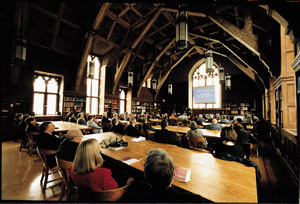Chicago:
Campus of the Big Ideas
>> The
launch of The Chicago Initiative-the University's five-year, $2
billion fund-raising effort-was marked by an April 12 event that
focused on Chicago's intellectual initiatives.
|
5
|
Clones,
genes, and stem cells: can we find the path to the greatest
good? |
The quick response to this session's query-at least judging from
the panelists' takes on the topic-is, how can we know until we're
allowed to try?
Not
that a snappy rejoinder resolves it. Indeed the discussion raised
as many questions as it answered. Stem-cell research, noted Lainie
Ross, associate professor in pediatrics and the MacLean Center
for Clinical Medical Ethics, is still "at the real embryonic
stage-pun intended."
|
|
|
A
discussion of stem-cell research raised "Why not?"
questions.
|
For
the nonscientists in the audience, she reviewed the basic science
involved in "harvesting" stem cells, which can generate
and renew tissue and are present in every organ, including those
in the adult body. "The source matters," said Ross.
Embryonic stem cells can be procured from the inner cell mass
of a "blastocyst," an early-stage embryo, or from an
aborted fetus. Stem cells can also be obtained from the placenta,
and adult stem cells can be procured from many tissues in the
human adult patient. The more mature the organism from which the
stem cells are derived, the less malleable they are and the more
likely to induce an immune response if placed in another person's
body. Nevertheless, adult stem cells are much more "plastic"-and
hold more promise-than scientists once thought, but they're neither
as ubiquitous nor as "pluripotent" as embryonic stem
cells, which can grow into any kind of cell.
For
those who find it morally repugnant to start a human life only
to end it at blastocyst stage for research, the controversy is
a cut-and-dried issue: federal funding for research with embryos
should be banned. The National Academy of Science disagrees, supporting
embryonic stem-cell research for therapeutic purposes. Leaving
his scientist-colleagues to argue for therapeutic cloning, Robert
Richards, PhD'78, professor in history, philosophy, psychology,
and the College, instead questioned whether reproductive cloning
is such a bad thing after all: "Physicians already intervene
and thwart nature," parents already "design" their
babies by choosing mates with good looks and smarts, and "repugnance,"
he said, is an unreliable moral guide. "It's doubtful reproductive
cloning would be undertaken except for fertility reasons,"
and after much thought his view is, "Why not?"
Why
not? was the question of the afternoon. As a silver-haired gentleman
in the audience asked, "Why do legislators have to be involved
in scientific research at all?" The answer is economics.
Panel moderator Janet Davison Rowley, PhB'45, SB'46, MD'48, the
Blum-Riese distinguished service professor in medicine, reminded
attendees that no U.S. scientist can now get federal funding to
learn how embryonic stem cells "do what they do." She
warned of an impending "brain drain," as researchers
leave the U.S. for countries more open to their work. And Ross
noted the irony in scientists scurrying to private funding sources:
"Doesn't it make more sense to keep controversial research
in the public sphere, where you can maintain higher levels of
oversight?"
One
positive result of the controversy, noted Olufunmilayo Olopade,
an associate professor in medicine who studies the genetics of
cancer, is that researchers no longer assume they'll receive funding.
"We have to be honest with Congress and educate the public.
It's not enough to say we need this funding so we can cure every
disease imaginable. We're a long way from that." Whether
they'll be allowed to try is a question still to be answered.
-S.A.S.
1.
In
the beginning: what do our origins tell us about ourselves?
2.
Homo sapiens: are
we really rational creatures?
3.
Integrating the
physical and biological sciences: what lies ahead?
4.
Money,
services, or laws: how do we improve lives?
5.
Clones, genes, and
stem cells: can we find the path to the greatest good?
6.
How will technology change
the way we work and live?
7.
Why do we dig up
the past?
8.
Art for art's sake?
9.
In the realm of
the senses: how do we understand what we see, hear, feel, smell,
and taste?
10.
Can we protect
civil liberties in wartime?
CHICAGO
INITIATIVE GOALS


![]()
